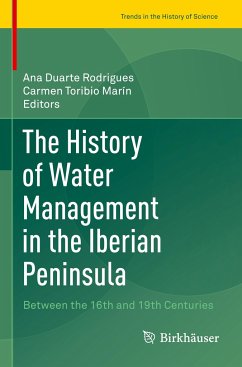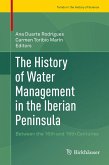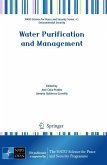This volume approaches the history of water in the Iberian Peninsula in a novel way, by linking it to the ongoing international debate on water crisis and solutions to overcome the lack of water in the Mediterranean.
What water devices were found? What were the models for these devices? How were they distributed in the villas and monastic enclosures? What impact did hydraulic theoretical knowledge have on these water systems, and how could these systems impact on hydraulic technology? Guided by these questions, this book covers the history of water in the most significant cities, the role of water in landscape transformation, the irrigation systems and water devices in gardens and villas, and, lastly, the theoretical and educational background on water management and hydraulics in the Iberian Peninsula between the sixteenth and the nineteenth centuries.
Historiography on water management in the territory that is today Spain has highlighted the region's role as amediatorbetween the Islamic masters of water and the Christian world. The history of water in Portugal is less known, and it has been taken for granted that is similar to its neighbour. This book compares two countries that have the same historical roots and, therefore, many similar stories, but at the same time, offers insights into particular aspects of each country.
It is recommended for scholars and researchers interested in any field of history of the early modern period and of the nineteenth century, as well as general readers interested in studies on the Iberian Peninsula, since it was the role model for many settlements in South America, Asia and Africa.
What water devices were found? What were the models for these devices? How were they distributed in the villas and monastic enclosures? What impact did hydraulic theoretical knowledge have on these water systems, and how could these systems impact on hydraulic technology? Guided by these questions, this book covers the history of water in the most significant cities, the role of water in landscape transformation, the irrigation systems and water devices in gardens and villas, and, lastly, the theoretical and educational background on water management and hydraulics in the Iberian Peninsula between the sixteenth and the nineteenth centuries.
Historiography on water management in the territory that is today Spain has highlighted the region's role as amediatorbetween the Islamic masters of water and the Christian world. The history of water in Portugal is less known, and it has been taken for granted that is similar to its neighbour. This book compares two countries that have the same historical roots and, therefore, many similar stories, but at the same time, offers insights into particular aspects of each country.
It is recommended for scholars and researchers interested in any field of history of the early modern period and of the nineteenth century, as well as general readers interested in studies on the Iberian Peninsula, since it was the role model for many settlements in South America, Asia and Africa.
"Milieu engendered this new and very interesting book devoted to water management in the early modern and modern Iberian Peninsula ... . Despite the variety of case studies and the slightly different research approaches, this collection reads well as a whole, and the main objective (water management) is a consistent thread throughout the various contributions. At the same time, the organization into three sections helps readers orient themselves and facilitates comparison between the different case studies." (Matteo Di Tullio, Technology and Culture, Vol. 62 (4), October, 2021)








